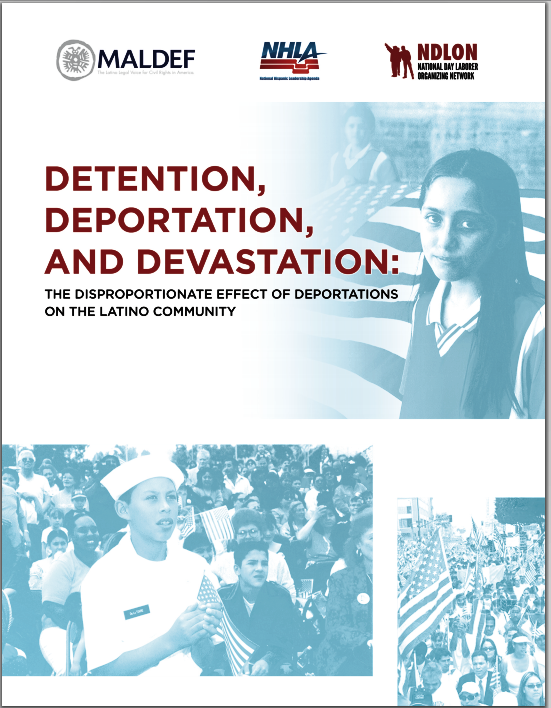 The Latino community is united in wanting to fix our nation’s broken immigration policies. Without a doubt, immigration is a galvanizing issue for the nation’s Hispanics, 75% of whom are United States citizens. The toxic rhetoric on immigration has affected us deeply, and that is why Latino voters last November generated a game-changing moment for this debate, giving us an opportunity to arrive at a solution. Our community is engaged and watching this debate closely. It matters not only to voters today, but it stands to shape the views of the nearly 900,000 Latino citizens who will turn 18 each year between now and 2028. This is an issue that impacts us, our families, and our neighbors. Our immigration, asylum, and naturalization laws must respect the dignity of the individual, reflect our nation’s commitment to human and civil rights, and deny state and local encroachment into this federal arena.
The Latino community is united in wanting to fix our nation’s broken immigration policies. Without a doubt, immigration is a galvanizing issue for the nation’s Hispanics, 75% of whom are United States citizens. The toxic rhetoric on immigration has affected us deeply, and that is why Latino voters last November generated a game-changing moment for this debate, giving us an opportunity to arrive at a solution. Our community is engaged and watching this debate closely. It matters not only to voters today, but it stands to shape the views of the nearly 900,000 Latino citizens who will turn 18 each year between now and 2028. This is an issue that impacts us, our families, and our neighbors. Our immigration, asylum, and naturalization laws must respect the dignity of the individual, reflect our nation’s commitment to human and civil rights, and deny state and local encroachment into this federal arena.
Our Principles
1. Provide a Path to Citizenship for Undocumented Immigrants
The ultimate goal of comprehensive immigration reform should be regularizing the status of the undocumented population, providing a clear and just path to citizenship and bringing them under the protection of our laws. By legalizing immigrants who live, work, and contribute to life in the U.S., our nation can deal fairly with those who have responded to an economic reality ignored by the law.
2. Restructure the Immigration System
The ultimate goal of comprehensive immigration reform is to bring all U.S. residents under the protection of our laws. To accomplish this, the immigration system as a whole must be restructured so that it is workable, just, and pragmatic. This means eliminating long lines, statutory ambiguity, and impractical visa caps, so that the system no longer fosters conditions for the growth of undocumented immigration. Immigration quotas should reflect migration patterns.
Temporary worker programs, from H1-B to agricultural programs, must operate efficiently, respond to employer needs, and most importantly protect the rights of workers. They should not be used to minimize opportunities for permanent immigration.
It is unfair to maintain a visa process that takes up to seven years for completion. Equally troubling, a person may be eligible for a visa at the time of application, only to become ineligible mid-process because of the backlog of applications awaiting adjudication. Certain laws and amendments enacted were designed to encourage undocumented immigrants to leave the county but have instead simply driven them deeper into the shadows and away from the public’s view.
3. Preserve Family Unity
Family unity has been a cornerstone of U.S. immigration policy since 1965. If immigration reform is to succeed, it must ensure that family reunification continues to be a primary objective. Latinos United believes that immigrants should have the opportunity to be reunited with their nuclear family, including spouses, children, parents and siblings. Restrictions in our current laws and bureaucratic delays often undermine family unity. To keep families intact, immigrants waiting in line should have their admission expedited, and those admitted on work visas should be able to keep their immediate families present. A reduction in family backlogs must be a focus of immigration reform. This includes special focus on immigrant children and on citizen children with an undocumented family member.
According to the Migration Policy Institute, about 5.5 million children in the United States, including 4.5 million U.S.-born citizens, live in families with at least one undocumented immigrant parent. Children in such families live in constant fear of parental deportation, with serious negative psychological consequences. Families face extreme hardships when a loved one is detained or deported, particularly when children are turned over to the child welfare system. Some remain forever separated from their families due to a loss of parental rights. DHS statistics indicate that parents of U.S. children accounted for almost 23% of deportees during the 27-month period from July 1, 2010 through September 31, 2012; 204,810 parents were deported – but no data are available on their children. DHS data indicate that the number of parental deportations has grown significantly as a result of the Secure Communities program; 23% of those arrested reported having a U.S. citizen child.
4. Ensure Due Process and Civil Rights
The judicial review of immigration cases has been severely limited in the last decade, eroding the system of checks and balances that protect the rights of immigrants. Latinos United Supports repealing jurisdiction-stripping provisions enacted in the Illegal Immigration Reform and Immigrants Responsibility Act of 1996 (IIRIRA) that prevent the federal courts from reviewing discretionary decisions in cases involving cancellation of removal, certain waivers of inadmissibility, voluntary departure, or adjustment of status as well as removal orders based on minor criminal offenses, and have restricted the ability of federal courts to hear class action challenges brought on behalf of groups of similarly situated immigrants.
5. Humane Enforcement of Immigration Laws
Our nation’s government has a sovereign right and duty to secure borders and other ports of entry into the United States. Creating a legal, safe, and orderly system that manages our immigration flows is an essential part of achieving that objective. Tragically, our current immigration system has helped create a deadly, chaotic, and lawless reality that is inconsistent with our national security goals and our constitutional and humanitarian values. Immigrants are often deported without knowing their rights and are not informed that “expedited removal” will prevent future legal entry to the United States.
Immigrants and those who “look like” immigrants are subject to arrest and detention based on a broken tail light or simply a police officer’s belief that they might be undocumented. Rational policies regarding legalization and future flows of workers will help to decrease the number of persons dying along the U.S.-Mexico border, the number of innocent migrants who are beaten and exploited in trying to come into the U.S., and the rise of vigilantism and associated violence. However, changes in border and interior enforcement are also essential.
6. Federal Pre-Emption
The Supremacy Clause in the Constitution (Article VI, clause 2) says that when Congress is empowered by the Constitution to legislate on an issue, it preempts or overrides related state legislation. When a conflict exists between federal and state law, the Constitution and federal law prevail. For more than a century, immigration law was considered a federal responsibility.
In recent years, anti-immigrant sentiment, programs that try to make state and local law enforcement “partners” in immigration enforcement, and the failure of the federal government to enact comprehensive immigration reform have led to dozens of state laws addressing immigration. In 2010 and 2011, 43 states passed 164 anti-immigrant laws. In the first half of 2012, 41 states enacted 114 immigration-related laws and adopted 92 resolutions. Most involve state enforcement of immigration laws. Together, they have contributed to widespread racial/ethnic profiling and the civil rights violations of immigrants, Latinos and others who fit the stereotype of “looking foreign,” regardless of their status in the country.
The best known, Arizona’s SB 1070, was followed by “copy-cat” legislation in Alabama, Georgia, Indiana, South Carolina, and Utah, some even more draconian than the original law they sought to emulate. The Supreme Court struck down three of the four major provisions of SB 1070 in June 2012, and a federal court struck down similar provisions of the Alabama and Georgia laws in August 2012. But the “papers please” provisions remain, and states continue to pass laws that violate the civil rights of millions of U.S. citizens and legal residents. Congress must create a fair and uniform immigration system nationwide.


